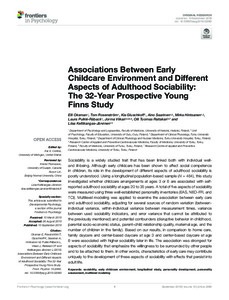Associations Between Early Childcare Environment and Different Aspects of Adulthood Sociability: The 32-Year Prospective Young Finns Study
Liisa Keltikangas-Järvinen; Mirka Hintsanen; Jorma Viikari; Aino Saarinen; Kia Gluschkoff; Tom Rosenström; Elli Oksman; Laura Pulkki-Råback; Olli Tuomas Raitakari
Associations Between Early Childcare Environment and Different Aspects of Adulthood Sociability: The 32-Year Prospective Young Finns Study
Liisa Keltikangas-Järvinen
Mirka Hintsanen
Jorma Viikari
Aino Saarinen
Kia Gluschkoff
Tom Rosenström
Elli Oksman
Laura Pulkki-Råback
Olli Tuomas Raitakari
FRONTIERS MEDIA SA
Julkaisun pysyvä osoite on:
https://urn.fi/URN:NBN:fi-fe2021042827045
https://urn.fi/URN:NBN:fi-fe2021042827045
Tiivistelmä
Sociability is a widely studied trait that has been linked both with individual well-and ill-being. Although early childcare has been shown to affect social competence in children, its role in the development of different aspects of adulthood sociability is poorly understood. Using a longitudinal population-based sample (N = 464), this study investigated whether childcare arrangements at ages 3 or 6 are associated with self-reported adulthood sociability at ages 20 to 35 years. A total of five aspects of sociability were measured using three well-established personality inventories (EAS, NEO-FFI, and TCI). Multilevel modeling was applied to examine the association between early care and adulthood sociability, adjusting for several sources of random variation (between-individual variance, within-individual variance between measurement times, variance between used sociability indicators, and error variance that cannot be attributed to the previously mentioned) and potential confounders (disruptive behavior in childhood, parental socio-economic status, parent-child relationship quality, maternal age, and the number of children in the family). Based on our results, in comparison to home care, family daycare and center-based daycare at age 3 and center-based daycare at age 6 were associated with higher sociability later in life. The association was strongest for aspects of sociability that emphasize the willingness to be surrounded by other people and to be attached to them. In other words, characteristics of early care may contribute uniquely to the development of these aspects of sociability with effects that persist into adult life.
Kokoelmat
- Rinnakkaistallenteet [19207]
